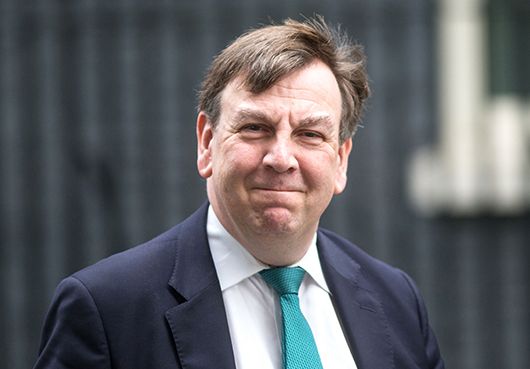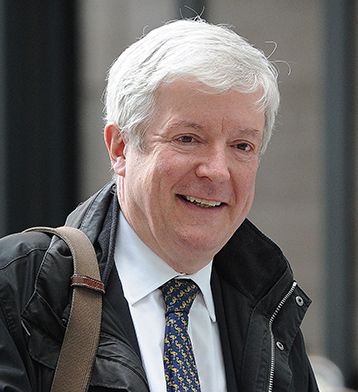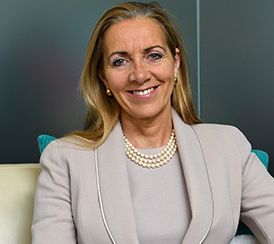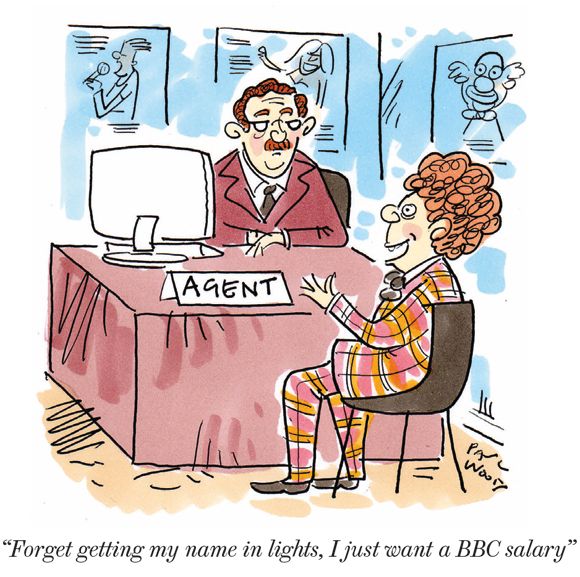John Whittingdale was "motivated by tribal instinct to cut the BBC in favour of its more politically reliable commercial rivals" ©Carl Court/Getty Images
On Monday 11th May 2015, John Whittingdale, MP for the Essex constituency of Maldon, was appointed Secretary of State for Culture, Media and Sport. Given his credentials as a Thatcherite ultra and Brexiteer, the Daily Telegraph confidently greeted the appointment as “an effective declaration of war” on a BBC facing renewal of its Royal Charter.
Whittingdale, the reasoning went, was not only motivated by tribal instinct to cut the BBC in favour of its more politically reliable commercial rivals; he also had 10 years as chair of the cross-party House of Commons Committee on Culture, Media and Sport, from where he attacked the BBC’s scale and funding platform. He was not only an ideologue, but a well-informed ideologue.
One year and one day later, however, on Thursday 12th May, Whittingdale unveiled his BBC White Paper. Now he spoke in parliament of “one of our country’s greatest institutions” and proposed not the BBC’s evisceration, but an end to the six-year freeze on its universally payable licence fee and a loose commitment to retain similar arrangements for the foreseeable future. This came wrapped in an 11-year charter, designed to protect the BBC from party politics at their most intense. Coming from a man famed for calling the BBC licence fee “worse than the poll tax,” it was not so much a climb down as a free-fall leap from a high ledge. The Daily Mail could only gasp that it was “a damp squib.”
Two sets of questions arise. First, what happened in these 366 days to turn a spit-roasting into a Mary Berry tea party? How was Whittingdale turned? Then, a second set of bigger questions: where does the White Paper actually leave the BBC? Has it gained politically bankable air cover to see it through the next decade of digital media turbulence? Or is the White Paper’s vision one in which the BBC’s true enemies are to be located inside the machine; operating through a newly structured board, some of its members government-appointed, and through the agency of the Office of Communications (Ofcom), the communications regulator, to which the White Paper offers unprecedented powers of external regulation over the BBC?
Worse still, might this turn out to be a White Paper that simply misses the point, framing its decisions around the archaic rivalries of linear television at the expense of reflection on less scrutable digital horizons?
The man at the heart of these questions, Whittingdale, is certainly on the Margaret Thatcher-adoring flank of his party. I first met him when I was in charge of BBC News in the late 1980s and he was Thatcher’s Political Secretary. Chris Patten’s contemptuous dismissal last year of Whittingdale as an “adolescent ideologue” would have struck no one as offensive in 1989, but the young politico I encountered was also sociable in his fogeyish way and interested in bridge-building. He is an operator, not an architect or a general.
Before directly serving the Iron Lady, Whittingdale had also worked for three Trade and Industry Secretaries: he was in Brighton’s Grand Hotel in 1984 when one of them, Norman Tebbit, was blasted by an IRA bomb. Whittingdale still celebrates these allegiances on his constituency website, giving prominence to a 2009 interview where he says: “in terms of influence on me, there’s only one person: Margaret Thatcher.”
There are three plausible theories about the turning of Whittingdale towards more consensual views. One states that the radical talk about the BBC was a crude feint, designed to disguise more subtle but strongly pro-market reforms.
A second theory imputes detailed strategic cunning to the David Cameron-George Osborne axis. In this, the prime minister and his chancellor see an opportunity to put BBC News under pressure during the referendum campaign, while entertaining the Tory awkward squad with Whittingdale’s BBC baiting. As a result, the government gets careful BBC coverage of the referendum to balance a Brexit-minded press, but deftly avoids a full-blown row about the BBC’s future. Internal BBC briefings since the White Paper’s publication have left some staff with the impression that this is the official-unofficial explanation for the Whittingdale turn. Having done the baiting, he was pulled up, in order not to disturb the referendum.
A third theory is more interesting. This considers the possibility that Whittingdale, for all his Thatcherite couture, has run a genuine assessment of what he likes to call the government’s “market intervention of around £4bn,” and decided that the evidence does not justify a frontal assault. To see the sharpness of the shift in Whittingdale’s positions, you need only compare his May 2016 White Paper with the contents of his House of Commons Culture, Media and Sport Committee report, published in February 2015.
Launching the Culture, Media and Sport report, Whittingdale labelled the licence fee “regressive, compulsory and expensive to collect” and made the case for new arrangements, centred on a German-style household levy. The BBC, he said, “should not be afraid to do less when the market is clearly providing a lot of existing content.” This report, however, also noted that previous Charter Reviews had been supported by extensive advisory processes and research. He argued that these be initiated forthwith, presumably because he believed the findings would buttress his own well-worn arguments. Within days of Whittingdale taking office as Culture Secretary, his civil servants were scouring the field for a panel of expert advisers. In addition, David Clementi, a former Deputy Governor of the Bank of England, was set to work reviewing BBC governance, alongside David Perry QC, who was already exploring the licence fee’s place within criminal law.
To this corpus of reasonably balanced expertise was added what would become one of the largest responses to a public consultation ever recorded in the UK. The Department for Culture, Media and Sport logged 192,564 inputs, supplemented by in-depth and structured polling.
The outcomes from these overlapping pieces of work were devastating to the Whittingdale position. To one long-held conviction after another, the consultation delivered a giant raspberry. Asked whether the BBC affected the market positively or negatively, 66 per cent said positive and 3 per cent negative. Was the BBC serving audiences well or very well? Over 81 per cent thought yes, 6 per cent no. Most respondents (74 per cent) also said that BBC content is sufficiently high quality and distinctive. On the issue of the licence fee, almost 60 per cent wanted no change. The Universal Household Levy, so diligently talked up by the Culture, Media and Sport Committee, found favour in just 3.9 per cent of valid responses. The BBC’s invisible hand in getting this vote out was, no doubt, a factor, but the damage was done. The White Paper disconsolately noted: “while a levy may have the potential to address some of the criticisms of the current system, including the criminal sanction for television licensing offences and the regressive nature of the charge, it currently does not command significant public support.” Whittingdale’s new chemistry set had exploded in his face.



It was important too that the rumours and hints from this consultation were in circulation long before the White Paper. The result was a visible boost to the confidence of senior BBC management, enabling Tony Hall, Director General of the BBC, to carve out a deal from a position of greater strength. The biggest risk he took was to settle an outline cash deal with Osborne in the summer of 2015, trading a thaw in the frozen licence fee and improved other benefits for the cost to the BBC of funding directly free BBC TV licences for the over-75s. He was accused of doing a dirty deal in the dark, but Hall, a canny Liverpudlian, has a good eye for an opponent’s weakness. He spotted early that Whittingdale’s obsession with the distinctiveness of the BBC was something to which he could apply the jujutsu principle, using the aggressive weight and velocity of the attacker against him. In a speech at the Science Museum on 7th September 2015, eight months before the White Paper, Hall proclaimed his own commitment to “a BBC that is more distinctive than ever—and clearly distinguishable from the market.” This quotation, highlighted in pale blue on the top right-hand corner of page 27 of the White Paper, is the seal which marks the BBC’s accommodation with Whittingdale: the White Paper had become an inside job.
Whether this concordat turns out to be a masterstroke cannot be judged with certainty right now. There is still hard and detailed work to be done on the future regulation and governance of the BBC to make it work.
This task is made easier by a meeting of minds on other issues. The Clementi review obligingly supported the widely held assessment that the BBC Trust itself had been a failure—a view shared even by Rona Fairhead, the Trust Chair. Clementi said it should be replaced by a unitary board, comprising of executives and non-executives. The trust’s regulatory functions would go to Ofcom, the body which successfully brought together regulation of telecommunications and broadcasting and which is the closest thing the UK has to an authority on internet issues. In the words of the White Paper: “a strong regulator to match a strong BBC.” If confirmation were needed that the White Paper was an inside job, it came with the decision to appoint Fairhead as chair of the new, unitary board.
"While the BBC looks big to a regional newspaper chain or ITV, it looks small compared to Apple or Google"As a founding non-executive board member of Ofcom myself, I applaud this course of action, but it does involve some unmeasured challenges. The easy part will be to enrich Ofcom’s talent pool. More subtle is the procedure through which Ofcom is to write BBC service licences, and which the White Paper says must take into account the government’s views. These licences provide the benchmark against which the regulator determines compliance or non-compliance. In some areas, this is straightforward, such as checking the number of hours given to UK music on Radio 1 and 2 or the amount of news and current affairs across all BBC media. It will be much less straightforward to judge the BBC’s overall success in meeting the distinctiveness criterion. How will complaints under this heading be adjudicated? Identical questions can be asked about the requirement for BBC impartiality.
For Whittingdale, it is clear that the BBC being “distinctive” is the big issue. The term is mentioned on 155 occasions in the White Paper and you can hear his own Wykehamist-populist cadences in some consultation questions, like this one: “Do you agree that BBC One and ITV are quite similar, apart from the adverts?” To this, by the way, 43 per cent answered yes—the closest Whittingdale got to a result.
The new unitary board will be responsible for delivering outcomes to support five re-drafted purposes of the BBC. These cover: impartial news; educational content; distinctive content, serving diverse communities and nations and regions; and projecting UK culture and values to the world. These sit beneath a re-drafted Royal Charter mission statement which requires the BBC “to act in the public interest, serving all audiences with impartial, high-quality and distinctive media content and services that inform, educate and entertain.”
It follows that the issue of who appoints non-executive directors to the BBC board is crucial. The White Paper proposes a problematic share-out between government and BBC-led appointments, neither ideally qualified for the role. A better alternative, surely, would be an independent commission, which could also take responsibility for making sure that the Ofcom board stays honest.
Wrapped within this thicket of tightly negotiated phrases, there are a number of things to celebrate. A welcome victory for Lenny Henry’s campaign to get the BBC to treat diversity seriously. A resounding re-assertion of the importance of the BBC World Service to the UK’s international interests. Confidence in the BBC’s still growing role in the UK’s increasingly prodigious creative economy. A better deal for Wales, Northern Ireland and Scotland, plus protection for S4C, the Welsh-language broadcaster treated with such scandalous disregard by Jeremy Hunt, when he was doing Whittingdale’s job.
More or less absent, however, is serious engagement with the bigger, global, digital realities with which the BBC and its commercial competitors must grapple. The argument won in this White Paper is that while the BBC looks big if you are a regional newspaper chain or ITV, it looks small compared to Apple, Google, Facebook and Amazon. The results of the consultation responses are explained by the fact that while we, the UK’s consumers and citizens, enthusiastically embrace online shopping, social media and most things digital, we are not indifferent to the disruption of local news and our high streets or to questions of privacy. Anxiety that the BBC is too big just doesn’t make the cut.
This makes the White Paper’s abandonment of the BBC’s current digital purpose worrying because without clear thinking and priorities on this front, the BBC will neither know where its opportunities lie or how it can deliver previously unattainable sources of value.
So, for example, when the White Paper repeats a worn BBC cliché that it’s time to open up the organisation’s priceless archive, it fails even to mention the copyright tangle which has defeated all previous attempts. There is no discussion of the tension between the BBC’s place in a still evolving digital commons and the limitations imposed by its own hybridity as a part commercial, part public service media company. To which parts of the BBC do its newly stated mission and constraints not apply? Nor is the BBC likely to become the gracious partner to UK social or commercial enterprises, about which the White Paper prattles, without clearer thinking on these questions. Opening up the BBC iPlayer to overseas subscribers makes sense both commercially and from a “soft power” point of view, but it can’t be done unless the BBC sorts out both its conditional access arrangements and its complex attitude with regard to rights.
These, however, are challenges not beyond an inspired new BBC board and a talented leadership team. With the public behind it and Whittingdale gasping for breath, the BBC is on a bit of a roll. Now, who would have predicted that?













